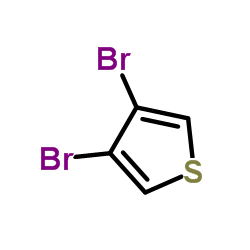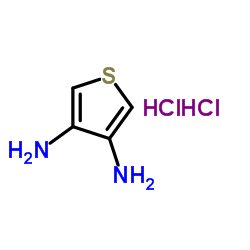78637-85-1
| Name | 3,4-Diaminothiophene dihydrobromide |
|---|---|
| Synonyms |
3,4-thiophenediamine
3,4-Thiophenediamine dihydrobromide thiophene-3,4-diamine 3,4-diamino-thiophene 3,4-Diamino-thiophen thiophene-3,4-diaMinedihydrochloride MFCD00671511 3,4-Diaminothiophene2HCl |
| Boiling Point | 385.5ºC at 760 mmHg |
|---|---|
| Melting Point | 150ºC |
| Molecular Formula | C4H6N2S |
| Molecular Weight | 114.16900 |
| Flash Point | 186.9ºC |
| Exact Mass | 114.02500 |
| PSA | 80.28000 |
| LogP | 2.07490 |
| Vapour Pressure | 2.55E-06mmHg at 25°C |
Synonym:3,4-Thiophenediamine dihydrobromid Section 2 - COMPOSITION, INFORMATION ON INGREDIENTS
Risk Phrases: 20/21/22 39 Section 3 - HAZARDS IDENTIFICATION EMERGENCY OVERVIEW
Harmful by inhalation, in contact with skin and if swallowed. Danger of very serious irreversible effects. Potential Health Effects The toxicological properties of this material have not been investigated. Use appropriate procedures to prevent opportunities for direct contact with the skin or eyes and to prevent inhalation. Section 4 - FIRST AID MEASURES Eyes: Immediately flush eyes with plenty of water for at least 15 minutes, occasionally lifting the upper and lower eyelids. Skin: Flush skin with plenty of water for at least 15 minutes while removing contaminated clothing and shoes. Ingestion: Do NOT induce vomiting. If conscious and alert, rinse mouth and drink 2-4 cupfuls of milk or water. Inhalation: Remove from exposure and move to fresh air immediately. Notes to Physician: Section 5 - FIRE FIGHTING MEASURES General Information: As in any fire, wear a self-contained breathing apparatus in pressure-demand, MSHA/NIOSH (approved or equivalent), and full protective gear. Extinguishing Media: Not available. Section 6 - ACCIDENTAL RELEASE MEASURES General Information: Use proper personal protective equipment as indicated in Section 8. Spills/Leaks: Sweep up, then place into a suitable container for disposal. Section 7 - HANDLING and STORAGE Handling: Not available. Storage: Not available. Section 8 - EXPOSURE CONTROLS, PERSONAL PROTECTION Engineering Controls: Use adequate general or local exhaust ventilation to keep airborne concentrations below the permissible exposure limits. Exposure Limits CAS# 78637-85-1: CAS# 169698-12-8: Personal Protective Equipment Eyes: Wear safety glasses and chemical goggles if splashing is possible. Skin: Wear appropriate protective gloves and clothing to prevent skin exposure. Clothing: Wear appropriate protective clothing to minimize contact with skin. Respirators: Wear a NIOSH/MSHA or European Standard EN 149 approved full-facepiece airline respirator in the positive pressure mode with emergency escape provisions. Section 9 - PHYSICAL AND CHEMICAL PROPERTIES Physical State: Crystalline powder Color: green gray Odor: None reported. pH: Not available. Vapor Pressure: Not available. Viscosity: Not available. Boiling Point: Not available. Freezing/Melting Point: 0 deg C Autoignition Temperature: Not available. Flash Point: Not available. Explosion Limits, lower: Not available. Explosion Limits, upper: Not available. Decomposition Temperature: Solubility in water: Specific Gravity/Density: Molecular Formula: C4H6N2S.2HBr Molecular Weight: 275.98 Section 10 - STABILITY AND REACTIVITY Chemical Stability: Stable under normal temperatures and pressures. Conditions to Avoid: Not available. Incompatibilities with Other Materials: Not available. Hazardous Decomposition Products: Nitrogen oxides, carbon monoxide, oxides of sulfur, carbon dioxide, hydrogen bromide, nitrogen. Hazardous Polymerization: Has not been reported. Section 11 - TOXICOLOGICAL INFORMATION RTECS#: CAS# 78637-85-1 unlisted. CAS# 169698-12-8 unlisted. LD50/LC50: Not available. Not available. Carcinogenicity: 3,4-Diaminothiophene dihydrobromide, 99% - Not listed by ACGIH, IARC, or NTP. 3,4-DIAMINOTHIOPHENE DIHYDROBROMIDE, 99% - Not listed by ACGIH, IARC, or NTP. Section 12 - ECOLOGICAL INFORMATION Section 13 - DISPOSAL CONSIDERATIONS Dispose of in a manner consistent with federal, state, and local regulations. Section 14 - TRANSPORT INFORMATION IATA Shipping Name: TOXIC SOLID, ORGANIC, N.O.S.* Hazard Class: 6.1 UN Number: 2811 Packing Group: III IMO Shipping Name: TOXIC SOLID, ORGANIC, N.O.S. Hazard Class: 6.1 UN Number: 2811 Packing Group: III RID/ADR Shipping Name: TOXIC SOLID, ORGANIC, N.O.S. Hazard Class: 6.1 UN Number: 2811 Packing group: III Section 15 - REGULATORY INFORMATION European/International Regulations European Labeling in Accordance with EC Directives Hazard Symbols: XN Risk Phrases: R 20/21/22 Harmful by inhalation, in contact with skin and if swallowed. R 39 Danger of very serious irreversible effects. Safety Phrases: S 24/25 Avoid contact with skin and eyes. WGK (Water Danger/Protection) CAS# 78637-85-1: No information available. CAS# 169698-12-8: No information available. Canada None of the chemicals in this product are listed on the DSL/NDSL list. CAS# 78637-85-1 is not listed on Canada's Ingredient Disclosure List. CAS# 169698-12-8 is not listed on Canada's Ingredient Disclosure List. US FEDERAL TSCA CAS# 78637-85-1 is not listed on the TSCA inventory. It is for research and development use only. CAS# 169698-12-8 is not listed on the TSCA inventory. It is for research and development use only. SECTION 16 - ADDITIONAL INFORMATION N/A |
| Hazard Codes | Xn |
|---|---|
| Risk Phrases | 39-20/21/22 |
| Safety Phrases | 24/25 |
| HS Code | 2934999090 |
|
~93% 
78637-85-1 |
| Literature: Liao, Bei-Sih; Liu, Shiuh-Tzung Catalysis Communications, 2013 , vol. 32, p. 28 - 31 |
|
~92% 
78637-85-1 |
| Literature: Wen, Li; Nietfeld, Jon P.; Amb, Chad M.; Rasmussen, Seth C. Journal of Organic Chemistry, 2008 , vol. 73, # 21 p. 8529 - 8536 |
|
~58% 
78637-85-1 |
| Literature: Kuraray Co., Ltd.; Kondou, Yoshirou; Nakano, Kirihiro; Otake, Tomiaki Patent: US8519150 B2, 2013 ; Location in patent: Page/Page column 33; 34 ; |
| HS Code | 2934999090 |
|---|---|
| Summary | 2934999090. other heterocyclic compounds. VAT:17.0%. Tax rebate rate:13.0%. . MFN tariff:6.5%. General tariff:20.0% |


